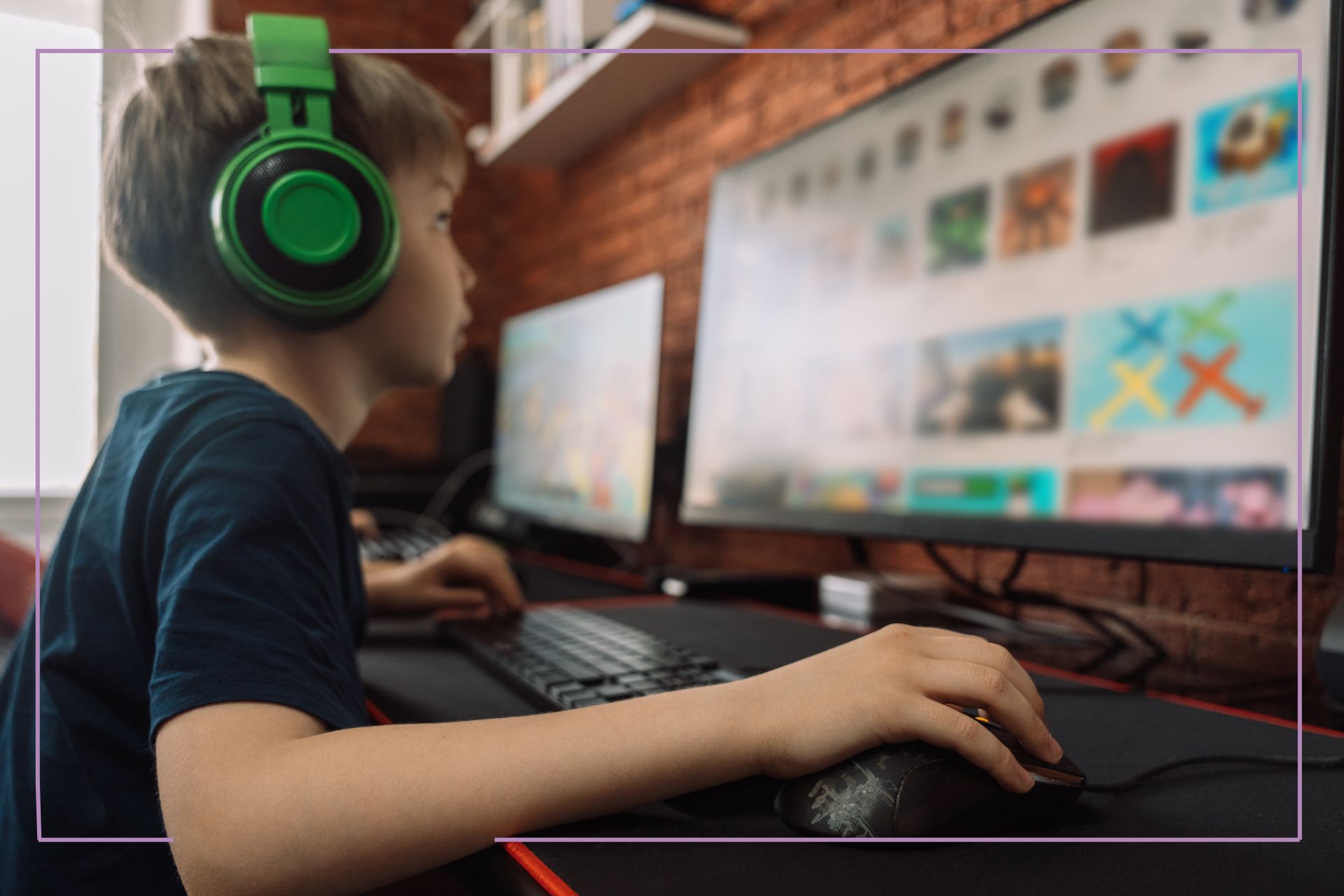
With children spending more time on tablets than ever before we’re lifting the lid on gaming addiction and how to keep your kids safe online.
For many young children today, gaming has become a necessary part of daily life, with some showing signs of excessive overuse, or even addiction, to their favourite games.
"I can often get caught up in worrying about gaming and thinking about it as an overall negative activity, which isn’t the case. As a matter of fact there are lots of benefits that gaming can provide for players when approached in a healthy way. Up until now I’ve taken very little time to sit down with my kids and take an interest in what they’re playing, so I’ll definitely be doing less fretting and more joining in on the fun going forward."
Trying to balance - and sometimes even reduce screen time and knowing when to switch Minecraft off (find out why Minecraft is so popular) can often seem futile. And once you add internet safety risks to the mix, the gaming dilemma becomes even more complicated. We know that the word ‘addiction’, especially when associated with children, can cause discomfort for some parents, but this is something that child psychologist Catherine Hallissey thinks is important to address upfront.
“I don’t have a problem with the use of the word, it’s just about making it clear that we’re not talking about a chemical addiction, we’re talking about a behavioural addiction. These are things that you do because they feel good. It’s when you overdo them, to the exclusion of other healthy activities, where I see it becoming problematic.”
As a mum myself, I have two young kids who’ve begun to show more interest in Roblox than real life, I often worry that they’ll become over-reliant on screens as their primary source of entertainment. But is this a genuine cause for concern, or do we all need to lighten up and give our children some leeway?
How to tell if your 8-year-old is addicted to gaming
There are many ways, as it is dependent on varying factors, but children and young people with a video game addiction were more likely to have a gaming system in their bedroom, and spend twice as much time playing video games than others as shared in a 2017 study into video gaming addiction. This study also revealed that 8.5% of the 8 - 18-year-old participants ‘exhibited pathologic patterns of play’.
The World Health Organization has officially classified ‘gaming disorder’ as ‘a pattern of gaming behaviour (“digital-gaming” or “video-gaming”) characterised by impaired control over gaming, increasing priority given to gaming over other activities to the extent that gaming takes precedence over other interests and daily activities, and continuation or escalation of gaming despite the occurrence of negative consequences’.
GoodtoKnow Family editor, Stephanie Lowe noticed this in her six-year-old son; "He had just started playing Minecraft (creative mode) at the weekend and loved it. But I realised he kept saying no to going to the park after school with his friends, when I asked why he replied 'I want to get home to play Minecraft'. It was all he talked about and he went to bed imagining what he would build the next day. I recognised the signs and started the conversation."
Stephanie explains how she approached it; "Instead of just blanket banning, we talked about how he felt when he played, he felt good. We talked about how and why he felt good about it - that that's what the games are made to do, to make you want to keep playing them. We talked about how it's my job as his mummy to keep him safe and that sometimes that looks like helping him to turn the game off. We then agreed to play Minecraft on weekends for two hours on Saturday and two hours on Sunday. He didn't love this initially, and he doesn't have to love it, the boundaries were agreed and set. And it's made a difference."
Fazeelah also noticed that her seven-year-old daughter had declined social interaction after being introduced to Roblox. “She was so engrossed in it, she was losing track of time, and in general lost interest in literally anything else that was going on. I knew it was becoming a problem socially because she became more withdrawn, and preferred playing games over interacting with friends and family,” she says.
“My initial intervention was quite extreme. I just removed the tablet without her knowing and took a proactive approach without making it a big deal. Then I formulated a reward jar, collecting stars for her to get to use the iPad.” Fazeelah has recently given her daughter access to her device again, requiring certain tasks to be completed before she can use it.
5 signs your kid may be addicted
- Constantly thinking about games
- Feeling irritable when not gaming
- Downplaying the amount of time they’ve spent playing
- Preferring to miss things so that they can game
- Spending less time with friends.
According to the NHS, signs your child may be addicted to gaming include: constantly thinking about games, feeling irritable when not gaming, downplaying the amount of time they’ve spent playing, preferring to miss school so that they can game, and spending less time with friends. Another symptom of gaming addiction highlighted in a 2024 study found a negative correlation between gaming and academic performance.
Mum-of-two Debbie-Ann was faced with this exact issue once her ten-year-old son started gaming. “He wanted to play games morning, noon and night, he was slacking off on his school work, and reading was becoming secondary,” she says. “He was also struggling to read what we would consider to be simple sight words, and he was struggling with spelling.”
She decided to introduce a set of daily chores and activities that her son needs to complete — at which point he can use his tablet for a maximum of two hours. Tasks include making his bed, brushing his teeth and combing his hair, creative play, outdoor play, reading and writing. “I see the improvement, and I didn’t allow him to go down the ‘summer slide’ so when he goes back to school I hope it will be an easy transition.”
How to help your child stay safe and happy while gaming
In January 2020 the UK Interactive Entertainment Association (Ukie) launched the Get Smart About P.L.A.Y campaign, which encourages parents to play games with their kids, learn about family controls, ask what their kids think and remain in charge.
Online child safety expert Jessica Chalmers champions communication as a key consideration for protecting kids from online harm. “If parents take the time to set up the safety settings on games with their children it gives an opportunity to talk about what you are doing, and opens up a conversation about digital safety,” she explains.
“Conversations are key when it comes to online safety. If we remain curious about what our children are doing online and ask questions, they will get used to speaking to us about their online lives and then hopefully if anything ever happens that makes them feel sad or uncomfortable they’ll be more likely to speak to us about it.”
While gaming often gets a bad rap, it can offer many benefits for players who can effectively regulate the time they spend while playing. These include cognitive benefits like problem-solving, task switching and multitasking; as well as soft skills like self-reflection and empathy. Gaming was even shown to have a positive effect on mental health following a study of nearly 5,000 11 to 16-year-olds in the UK.
When to be worried about your kid’s gaming?
You know your kids better than anyone, so if you’re sensing patterns of behaviour that are making you feel unsettled, don’t ignore them. “I’m a big fan of parents feeling empowered to trust their own intuition on this, so if you are noticing signs in your child that are worrying you then it’s really good to take action,” advises Catherine.
The World Health Organisation advises that in order for gaming disorder to be diagnosed, ‘the behaviour pattern must be of sufficient severity to result in significant impairment in personal, family, social, educational, occupational or other important areas of functioning’.
“If you are concerned that your child is showing these signs I would recommend speaking to your GP,” says Jessica. Alternatively you can seek advice, guidance and support from charities like Young Minds, Family Lives and NSPCC.
Featured experts
Our content here at GoodToKnow is all about making it make sense for you as parents and carers. We get that you don’t want your kids to grow up too fast? Science says this parenting style is the way to go and asking your kid this question could do wonders for their self-esteem – here’s why, as well as why you shouldn't tease your child about having a ‘boyfriend’ or ‘girlfriend’, according to parenting experts.







